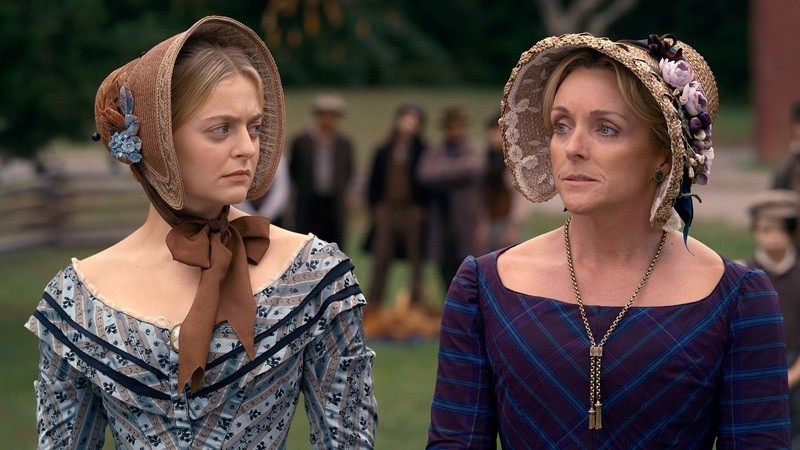There’s an early moment in “Dickinson,” the exuberant, messy new Apple TV Plus series from creator Alena Smith (“The Affair”), when Emily sits down to write. This is no “I couldn’t help but wonder” Carrie Bradshaw moment, nor is a scene of feverish scrawling, words spilling over in an outpouring of emotion. She’s got an idea—death, a carriage, something—but she is not morose. She’s got an itch, a need to wrestle with that idea. She wiggles her fingers in the air, wriggles in her seat, shakes herself, moves some more. It’s active—an athlete psyching herself up for a big quarter, a pianist cracking first her fingers and then her neck, an actor getting ready for a major audition. It’s not daydreaming, it’s not pouring out emotions, it’s not workmanlike. It’s more like the moment before a race, or a chase. The thing she wants to say is out there. She’s just got to catch it.
Smith and the rest of the writers behind “Dickinson” haven’t quite made that catch themselves, but it’s sure entertaining watching them try. In the three episodes provided to critics, “Dickinson” shows promise in a number of areas—among them striking visual language, an irresistible playfulness in the music supervision, and a sense of fun, if not humor, that pervades even scenes about mortality or misogyny. It’s also got Hailee Steinfeld, which, frankly, is more than enough to give “Dickinson” at least a trial run. Its willingness to just go for it, to embrace its peculiar blend of anachronism, angst, irony, self-awareness, and unabashed youthfulness, proves so winning that even when the show’s sprint sends it face-first into a wall, you can’t help but admire its gusto. And run into walls, it does.

The conceit is somehow both simple and ludicrous. Emily Dickinson (Steinfeld) does not want to get married, she does not want to do housework, and she does not want any of your bullshit. She just wants to think, live life, write, and become a great poet. There are few people in her life excited about any of those goals. Her mother (Jane Krakowski), who built her own self-worth on the idea that she’s a housewife nonpareil, wants her hitched ASAP and would really like her to do chores in the meantime. Her sister Lavinia (Anna Baryshnikov) would also love for those things to happen, though her reasons are her own. Her brother Austin (Adrian Enscoe) doesn’t get it, but as long as Emily doesn’t get in the way of his engagement to her best friend Sue (Ella Hunt), he doesn’t much care. And her father’s obvious devotion wars with his bone-deep belief that women don’t belong anywhere but the home or beside their husbands—not in colleges, not in professions, and certainly not in the papers.
She’s a young rebel, parents just don’t understand, you get the idea. What makes “Dickinson” interesting is that it marries the comfortable tropes of the coming-of-age drama to the machinery of the biopic, then coats that fresh-forged creation in something much wilder. One could wish the balance was reversed, or that it was all springing from that raucous place, but it’s hard to get too frustrated. Sure, one might roll one’s eyes a little when, in the pilot, Emily spends much of her time trying to come up with the perfect line to follow “Because I could not stop for death,” but how mad can you be about it when death, who is Wiz Khalifa, rolls up to her house in an elegant carriage and they cuddle and talk about the various strains of immortality? It’s a little silly, and it’s a little superficial, but it’s also death as played by Wiz Khalifa, literally stopping for Emily, who drops a dark cloak to reveal a bloodred ball gown. Perhaps you are capable of resisting that, dear reader, but I am not.
It’s all just smart and engaging enough to keep “Dickinson” from tilting too far in the direction of stupid. That doesn’t, however, stop it from straying into territory that’s a little flat. Steinfeld, excellent, never lets the air totally out of the balloon; her Emily’s resting point is actually a state of readiness, leaving her prepared to jab, entice, distress, coerce, seduce, or befuddle at any moment (Steinfeld takes obvious pleasure in the moments Emily chooses to perform or enhance her own eccentricity, placing a lot of extra zest on a line about her role as transcriptionist for God). Only when writing—or, you know, hanging out with death—does she stop, and then it’s to teeter on the edge of brilliance, ready to jump in as soon as she can get her hands on those perfect words. Yet the world’s relationship to Emily rarely seems to change, at least in these early episodes. No matter what she does, the status quo is nearly always maintained.

It’s likely that will shift as the series moves forward; the final moments of the last episode provided for review throws a giant wrench into the fraught love triangle that places Emily and Austin on either side of the grieving Sue who, as she frequently reminds the Dickinson family as a whole, is pretty much entirely without power in or control over her life, an imbalance she’d greatly like to change. This isn’t the first fictionalized account of Dickinson’s life to arrive this year—there was also “Wild Nights with Emily,” from writer-director Madeleine Olnek—and like its most recent predecessor, “Dickinson” calls upon recent discoveries made about Emily’s sexuality, relationships, and queerness. That’s part of what makes the show’s exuberance so appealing. The series, like Emily herself, seems to thrum with the energy that springs from being fully, authentically itself—its foolish, often irresistible self.
The camera gazes at these beautiful young people with not so much reverence as wonder, as if trying to capture the thrill of realizing that person you can’t wait to kiss has a freckle you never noticed before. The music kicks open the door with a flourish, like it’s late for a party that can only now truly begin. The words of her poems, scrawled across the screen in gold by some immortal hand, are reminiscent of nothing so much than a binder, covered in the lyrics to a favorite song by a band that just totally gets you. Perhaps that’s what makes this goofy show feel, somehow, like poetry: It is at its best when trying to capture the aching, gorgeous messiness of being young, hot, brilliant, and terribly alive.












